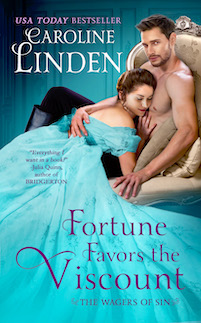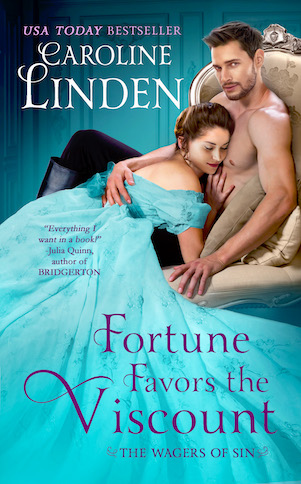 There was little to alarm about the exterior of the Vega Club: an imposing mansion near Piccadilly, seven bays wide and three floors tall of clean gray stone, with pedimented windows and iron railings leading to a broad door painted dark blue. But everyone knew that wickedness and vice raged within.
There was little to alarm about the exterior of the Vega Club: an imposing mansion near Piccadilly, seven bays wide and three floors tall of clean gray stone, with pedimented windows and iron railings leading to a broad door painted dark blue. But everyone knew that wickedness and vice raged within.
Emilia Greene peered up at it through the grimy window of the hired hackney, and took another bracing swig from the flask. She replaced the cap with a grimace; no wonder men did stupid things when drinking brandy.
Just the sort of courage you need right now, she reminded herself. She stowed the flask in her reticule and opened the door.
The carriage creaked as the driver turned to look at her stepping down. The sky was overcast, the morning fog muffling the streetlamps that still burned. “Thought you’d changed your mind, miss.”
“No.” She handed him a coin. “How much for you to wait half an hour?”
He glanced up at the sickly gray sky and sighed heavily. “Three shillings.”
Too much. “Never mind, then,” she said, pushing aside her misgivings about being marooned at the most notorious gaming hell in London. “Thank you.”
He touched his cap as he lifted the reins, and within a minute she was alone.
Emilia faced it again, her own dangerous Rubicon. She considered another sip of brandy, then forced down her nerves and mounted the step.
Early morning, she had been told, was the best time to go. The club closed around dawn, when any lingering patrons had been turned out, and the only people present would be staff, cleaning up after a night of scandal, debauchery, and all manner of cheating and plundering. Or so she assumed; something wicked must happen there, to have earned such a reputation.
Once upon a time, her friend Arabella had plotted in excited whispers how they might manage to sneak inside gentlemen’s establishments like the Vega Club. They had an air of danger, of licentiousness and tantalizing ruin, of unbearable thrills and excitement. Emilia had played along, more amused than engaged. Of course she’d never sneak into a gaming hell, let alone the most infamous one of all.
No, it turned out she would simply walk up to the door and let herself in.
The entrance hall was as fine as the one at the Willows, with a black and white marble floor and walnut wainscoting. She could see past some towering potted palms into a large salon, where servants swept polished wooden floors and dusted around elegant furnishings. It could have been the aftermath of any society ball. It was much like the great house where she had grown up, and she found that even more disconcerting than if the walls had been covered in black satin and hung with obscene paintings.
How very … ordinary. Arabella would be so disappointed.
“Apologies, ma’am, the club is not open.” A large burly man appeared from nowhere right in front of her.
 Emilia almost leapt out of her skin. “I’m here to see Mr. Dashwood,” she said, straightening her shoulders and aiming for a regal, implacable air.
Emilia almost leapt out of her skin. “I’m here to see Mr. Dashwood,” she said, straightening her shoulders and aiming for a regal, implacable air.
“An appointment is required for that,” he said, unperturbed. “Send a note and Mr. Dashwood will fix a time if he wishes to see you.”
“Don’t be ridiculous.” She took a note from her reticule and held it out. The man hesitated, and she fluttered it at him, brows rising. “At once, my good man.”
It was the sort of thing Lady Watney would say, imperious and slightly impatient. Emilia had disliked that sharp tone when it was used on her, but she’d always obeyed it. To her relief, this man did the same.
With a frown, he took the note, then hesitated again.
Emilia gave a delicate, slightly exasperated sigh. “Read it if you must, but take it to Mr. Dashwood.” She kept her chin up as he unfolded the paper.
The note was a fraud, but a very convincing one. Oliver wouldn’t mind that she’d taken liberties with his name; he was the only member of the Vega Club she knew, so she’d had little choice. She only hoped no one would know that Oliver had been rusticating in Aberdeen for the past three months, and couldn’t possibly have signed this note.
The large man in front of her shot her an assessing look, as if he weren’t fooled, but he merely nodded and said, “Wait here, please,” before he disappeared through a concealed door.
Carefully she let out her breath, fighting off any sense of relief. This was only the first hurdle, and the next would be far more difficult. So make a running start at it, she told herself. She stepped forward and gently pressed open the door, slipping through it.
It led into a long, narrow antechamber, with three doors. Two were closed but the one at the end was open; the man who’d taken her note leaned in that doorway, arms crossed.
“A right haughty little ladyship,” he was saying in disapproval. At the click of the door behind Emilia, he glanced over his shoulder. “If you’ll wait, ma’am—”
“I am here to see Mr. Dashwood on an extremely urgent matter,” she retorted, still projecting Lady Watney. “And see him I shall.”
He turned. He was a big man, tall and broad-chested, and if he meant to throw her over his shoulder and pitch her back into the street, she wouldn’t be able to stop him. “No, ma’am. That won’t be possible.”
“Nonsense,” she said crisply. “It will be a very great loss to him if he doesn’t hear what I have to tell him.”
 An even greater loss to her, but she didn’t want to think about that, let alone say it.
An even greater loss to her, but she didn’t want to think about that, let alone say it.
His face settled into stony lines, and her stomach took a swift drop as she thought he might actually throw her out—until he paused. He glanced into the room behind him, then cast his eyes upward. “As you wish, madam.” He stepped to the side, bowing obsequiously and sweeping one arm toward the doorway.
Emilia ignored his tone and hurried into the room before he could change his mind. The big man closed the door behind her with a loud snap.
The room was dominated by a billiard table. Three lamps, suspended above the table, illuminated the green felt surface. A man stood at the far end, his jacket off and shirtsleeves rolled up, holding a cue. His face was impossible to see in the shadows.
“Come in, Miss Greene.” His voice was rich and smooth; dry, faintly amused. “Since you insist.”
Now Emilia’s nerves began to twitch, when she most needed them to remain firm. “Mr. Nicholas Dashwood?”
He bowed his head in acknowledgment. “The very one.”
“Thank you for seeing me, sir.”
“I wouldn’t, normally.” He glanced pointedly at the note lying open on the edge of the billiard table, its forged signature just visible. “A delicate and important matter, is it?”
Emilia nodded once. “I have a proposition to make to you.”
His shoulders shifted. He leaned down to line up his cue. The light fell across a hard, angular face and cropped hair. His nose had clearly been broken, but his lashes were thick and dark and he was undeniably attractive, if in a dangerous sort of way. “I rarely accept propositions.” He took the shot he’d set up, sinking the red ball into the pocket right in front of Emilia.
“You’ve never received one like this,” she told him honestly.
He straightened and began unrolling his sleeves. He was back in shadow, but she still saw his eyes flick downward, moving over her with lightning quickness and hot enough to make her face burn. “Odds are that I have.”
She flushed. “It’s not that sort of proposition. Don’t flatter yourself.”
He paused, looking at her more keenly. The lamplight caught his face, giving her a good look at him for the first time. His eyes were amber, like a cat’s, she thought; glowing golden-brown, vibrant enough to see from across the billiard table. His dark hair was cut short, but not short enough to hide its tendency to curl around his ears. He fastened his cuffs and reached for his jacket, flung over a nearby chair. “Well, that does intrigue. What is it?”
 “A business proposition.” Please let this work, she prayed one last time.
“A business proposition.” Please let this work, she prayed one last time.
His mouth curled. “No.”
She started. “You haven’t even heard it!”
“I don’t need to.” He pulled on his jacket, settling it on his shoulders with a sharp jerk. He smoothed one large hand over his chest, and suddenly looked far more dangerous, in his elegant evening attire, than he had before.
“Please,” she said in a rush. “I came here at dawn, specifically to speak to you when the club isn’t busy. The least you can do is listen.”
“But I don’t need any more business dealings.” He said it gently, as if speaking to a child. “I don’t wish to waste your time.”
“It’s a cracking good one, my proposition,” she retorted, losing her temper for a moment. “Only an idiot would refuse it.”
His face had grown hard as she spoke, but at the last he suddenly grinned. “Indeed? I’ve been called worse.” He regarded her for a moment, then waved one hand toward a door at the back of the room. “Very well. I discuss business in my office.”
Head high, heart pounding, she marched through the door and took the seat he indicated. He went around the desk and sat down, leaning back with that trace of amusement still clinging to his face. “Do tell me all about your unrefusable proposition, madam.”
She frowned at the way he said the words. “Do you know the name Henry Sidney?”
“He’s not a member, if that’s what you’re asking.”
“Of course he’s not,” she said tartly. “He’s been dead for a hundred years.”
“Has he really?” He lifted one shoulder. “Then I can hardly know him.”
She took a deep breath. This man. “With his wife Genevieve, Henry had a son, Thomas, who had a son, and a grandson, and so on and so on.”
“How remarkably virile of dear Henry,” he said, sounding more than a little derisive. For a moment, Emilia burned to storm out and let the stupid man carry on as he was, a low-class cardsharp.
But she couldn’t do that. Damn him. She needed him.
She kept her seat and carried on, her voice growing stern. “But with his second wife, Catherine, Henry had another son, William. William of course was a younger son, but he had a son and grandson, too. Do you know the name Samuel Sidney?”
The amusement left his face, snuffed out like a flame. “You’d better go, Miss Greene.”
 “You do know who he is.” It was embarrassing how much her confidence soared in that moment. Until that tiny sign that he knew, there had been a sliver of doubt in her mind. If she’d got the wrong man, not only would this interview have been a waste, her entire scheme—desperate as it was—would have turned to dust. “He also called himself Sam Blake and Sidney Blake, I believe.”
“You do know who he is.” It was embarrassing how much her confidence soared in that moment. Until that tiny sign that he knew, there had been a sliver of doubt in her mind. If she’d got the wrong man, not only would this interview have been a waste, her entire scheme—desperate as it was—would have turned to dust. “He also called himself Sam Blake and Sidney Blake, I believe.”
“He’s dead,” said her host coldly.
“I know.” She rubbed her hands on her knee, her palms damp with sweat inside her gloves. Now her heart was pounding from relief. “It took a devilishly long time to sort it all, particularly since he changed his name so many times. But I’ve got it right, haven’t I? He was your father.”
“Only,” said Mr. Dashwood thinly, after a very long pause that make her think he might deny it after all, “in the most nominal sense.”
“That’s the only sense that matters.” She couldn’t stop a smile. “Then you, sir, are the next Viscount Sydenham.”




